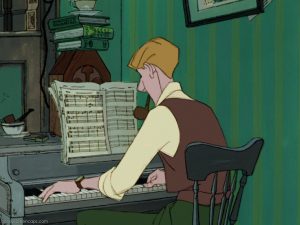Interview: Composer Pieter Schlosser
Posted on May 23, 2016 at 3:50 pm

He began playing the piano when he was 9 or 10. “It was my mother’s instrument. we had a piano at the house so it was only logical and practical that that would be the first instrument that I learned. Initially it was me just being curious. This was in Guatemala where I was born and when we moved to Austria, that’s when I started singing in a couple of choirs at school. Music is very much a part of the curriculum there, and I began taking formal piano lessons with a teacher. I was surrounded by music all the time and there was a point that I was singing so much that I seriously considered joining the Vienna boys choir. I was sort of an unusual kid in that sense where I wanted to do things that ‘normal kids’ didn’t necessarily think of. My parents always had music around the house and of course living just outside of Vienna and Austria being the Mecca of music, it was very much a factor.” He was also influenced by the Disney movies he saw, especially “101 Dalmatians,” because “one of the main characters writes jazz tunes so there was always jazz in my life. Roger was essentially scoring his life so that was pretty fascinating to me to have all those elements combined, the guy actually writing jazz tunes and writing about this horrible woman who is in his life. So that is incredibly interesting and it was one of the first things that grabbed me. And then after that the next thing I remember was “The Little Mermaid,” which also sparked my love of redheads in my life.” (He is married to a redhead.)
Schlosser has also composed the music for games. “What’s interesting about games is that they are very much nonlinear. They are linear only when you get to what is called cut scenes. So as a player to get to a certain point of the story, it’s basically the scene of the movie, to tell part of the story from a to b. So that one works very much like a film. As far as the gameplay it’s very much interactive and the score is really dependent on what the player does and what’s going on during the game which can vary, there can be nothing going on for 30 minutes and then all of a sudden a monster jumps out at the screen and you have got to find him and the music has to kick in. And so when you are scoring for a game all that has to be kept in mind and what’s interesting about the way that game consoles work now is that you can trigger all these different elements as things happens on screen. So you can write a piece of music that is pretty intense and full on from the beginning but you deliver it to the game company in such a way that they are able to then trigger these different tracks as the game play happens. Now with a film you have an entire arc of about an hour and a half that happened so you’re able to develop themes throughout the entire film and develop your music as the story develops. And in TV it’s a different. When you’re talking about the ‘normal’ TV channels that are dependent on advertisers like ABC, NBC, Fox, whatever, you have a TV show that’s broken up into maybe six or seven acts and those acts are about maybe eight minutes, maybe 10 minutes, maybe they have commercials in between so you have to build your music so that you keep your audience entertained and intrigued so when you cut for commercial they go ‘Oh my God what’s going to happen next?’ so they don’t switch the channel. And that’s changing a little bit now with Netflix and Amazon and Google where you have an arc of an hour or 45 minutes when there aren’t any commercials.”
This was a factor with “You, Me, and the Apocalypse,” which is a joint US/UK production. “So what Steve Jablonsky and I scored was the UK version which does not have commercials in between. So we scored it as a continuous 45 minutes thing sort of the way that maybe a NetFlix show works. And the acting and the story very much informed the way that we were going to approach the scoring of it. There are a lot of comedic moments but still it is about the end of the world. Steve had already discussed a lot of these topics with the producers so he called me and said, ‘Hey, I have this TV show. Do you want to do it with me?’ He had established certain themes and certain sounds like using the banjo for some of the characters and there was an organ also. Certainly tempo and instrumentation were very much a key factor in determining how we were going to score and what was interesting was that in the middle that changed quite a bit and we went a lot more electronic and left a lot of the acoustic instruments behind.”
He is currently working on “What About Love,” starring Sharon Stone and Andy Garcia, who play the parents of a girl who is injured on a trip to Europe. “The relationship between Andy Garcia and Sharon Stone’s characters is really on the rocks and their daughter being in mortal danger in a hospital makes them question everything and kind of go, ‘What is really important here?’ It is a Spanish and German co-production this time. And so they came to me, I scored a couple of scenes for them and somehow it resonated with Klaus the director and I ended up getting the job.” Whether it is television, a movie, or a game, he says, “ultimately it’s about story. So what is important to me that the story resonates.”
